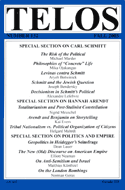Each Tuesday in the TELOSscope blog, we reach back into the archives and highlight an article whose critical insights continue to illuminate our thinking and challenge our assumptions. Today, Philip Crone looks at Aryeh Botwinick’s “Same/Other versus Friend/Enemy: Levinas contra Schmitt,” from Telos 132 (Fall 2005).
 Representative Joe Wilson’s outburst during President Obama’s speech to Congress on healthcare reform in some ways overshadowed the content of the speech itself. Had Wilson shouted out in another, non-American context, such as during the Prime Minister’s Question Time in the United Kingdom, he would have received little notice. But with an eye to the protocol and tradition surrounding presidential addresses to Congress in the United States, commentators from both the left and the right lambasted Wilson’s actions. Of course, Wilson was not without his supporters who seemed to have little concern for such protocols, or at least seemed to think that the gravity of the situation warranted violating the traditional standards. Still, Wilson’s yell stood in stark contrast to the lines offered at the end of Obama’s speech in which the President called for “[replacing] acrimony with civility.”
Representative Joe Wilson’s outburst during President Obama’s speech to Congress on healthcare reform in some ways overshadowed the content of the speech itself. Had Wilson shouted out in another, non-American context, such as during the Prime Minister’s Question Time in the United Kingdom, he would have received little notice. But with an eye to the protocol and tradition surrounding presidential addresses to Congress in the United States, commentators from both the left and the right lambasted Wilson’s actions. Of course, Wilson was not without his supporters who seemed to have little concern for such protocols, or at least seemed to think that the gravity of the situation warranted violating the traditional standards. Still, Wilson’s yell stood in stark contrast to the lines offered at the end of Obama’s speech in which the President called for “[replacing] acrimony with civility.”
Civility and respect for differences of opinion have long been heralded as hallmarks of American liberal democracy. Yet it is a natural question to ask why such characteristics have been given such a high value. Political debate and argument is fundamentally premised on differences of opinion between two or more parties, and if these parties are fully convicted to their beliefs why should they let principles of civility stand in the way of achieving their political goals? In his article “Same/Other versus Friend/Enemy: Levinas contra Schmitt,” Aryeh Botwinick examines such issues by considering Carl Schmitt’s conception of politics, which is fundamentally grounded on the distinction between “friends” and “enemies.” For Schmitt, identifying one’s enemies is the key to political societies:
His [Schmitt’s] moral/metaphysical/political indictment of liberal society is that it is depoliticized—and therefore weak, apathetic, materialistic, directionless, and disoriented. By contrast, a political society that has clearly identified its enemies and has psychologically—if not yet fully materially—girded itself up to do battle against them has attained properly speaking to the level of the political. For Schmitt, the fault line for differentiating between properly political societies and improperly political societies is the delineation of enemies and the preparation and readiness for war in the first case and the neglect (or un- or under-cultivation) of enemies and the consequent lack of preparation for war in the second case.
Thus, liberal society fails to be political because it fails to identify its enemies, whether internal or external, and to prepare for war against these enemies. Botwinick takes exception to Schmitt’s characterization of political society, arguing that “Schmitt correlates politicization with readiness to wage war only because he works with a tacit background premise—namely, inequality.” When one accepts inequality as a fundamental characteristic of society, as Schmitt does, it makes sense that an elite group would use war to defeat and subjugate its enemies. Botwinick suggests that once equality is taken as a premise, liberal society too becomes political. Botwinick writes that “the politicized nature of liberal society finds expression in the progressive waves of equalization that have characterized modern societies.”
Botwinick proceeds through other deconstructions of Schmitt’s arguments and takes to task his readings of Hobbes, implications of the friend/enemy distinction for international relations, and Schmitt’s relation to Christianity. Throughout, he reaffirms the possibility of politics in liberal society divorced from the concepts of friend and enemy, and provides analysis indispensible for our current political situation as we decide whether political rivals are enemies or simply fellow travelers in the scheme of liberal society.
Read the full version of Aryeh Botwinick’s “Same/Other versus Friend/Enemy: Levinas contra Schmitt” at the TELOS Online website. If you are affiliated with an institution that is an online subscriber to Telos, you have free access to our complete online archive. If not, you can purchase 24-hour access to this and other Telos articles at the low rate of $5/article.








